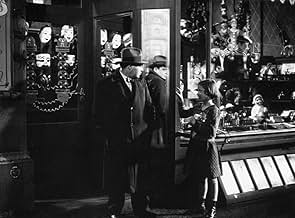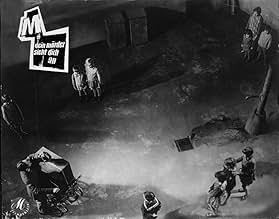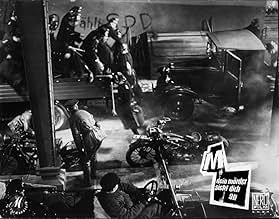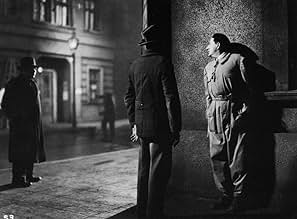M: Eine Stadt sucht einen Mörder
Als die Polizei in einer deutschen Stadt nicht in der Lage ist, einen Kindermörder zu fangen, beteiligen sich andere Verbrecher an der Menschenjagd.Als die Polizei in einer deutschen Stadt nicht in der Lage ist, einen Kindermörder zu fangen, beteiligen sich andere Verbrecher an der Menschenjagd.Als die Polizei in einer deutschen Stadt nicht in der Lage ist, einen Kindermörder zu fangen, beteiligen sich andere Verbrecher an der Menschenjagd.
- Regie
- Drehbuch
- Hauptbesetzung
- Auszeichnungen
- 2 wins total
Zusammenfassung
Empfohlene Bewertungen
Lang, a master of the German expressionist film, shot his first talkie, a crime drama considered a landmark in the story of suspense movies... It was a shocking idea for its time, based on the real-life killer Peter Kurten, headlined as the Vampire of Düsseldorf...
'M' is about a terrorized city, and a plump little man with wide eyes (often chewing candy) who is a pathological child-killer, unable to control his urge for killing...
The film embodies several Lang themes: the duality between justice and revenge, mob hysteria, the menacing anticipation of watching a helplessly trapped individual trying fruitlessly to escape as greater forces move inexorably in, and, for probably the first time in the cinema, it adds a new dimension to suspense: pity... For the killer is clearly mentally sick... He cannot overcome the overwhelming compulsion of his murderous disease, and yet, we see him hunted down and almost lynched as a criminal, rather than treated as a sick man...
Early in the film, the killer is heard whistling the Grieg theme from 'In the Hall of the Mountain King'. This theme inexorably becomes imbued with menace... And when we see no more than a girl looking in a shop window, the melody on the sound-track told us chillingly that the murderer is there, just out of sight...
The Murderer is played by Peter Lorre in a virtuoso performance that has barely been matched in all the thrillers he has made since 'Casablanca,' 'The Maltese Falcon,' and 'The Mask of Dimitrios.' When the photographs of his victims, all little girls, are shown to him, he jumps back and twitches with horror...
With powerful visuals, Lang's motion picture is Lorre's first film... His performance as the corpulent, hunted psychopath is a masterpiece of mime and suggestion... Lorre is the archetypal outsider-outside the law and society because of his compulsive crimes, outside the balancing society of the underworld because he is not a professional criminal... He had only twelve lines of dialog...
In the most famous of all about a pathological killer - Alfred Hitchcock's 'Psycho' - Anthony Perkins lacked not only the threat of the tortured Peter Lorre, but also the dimension of invoking our incredulous sympathy...
'Psycho' reeked with blood and horror, whereas the suspense of 'M' is subtle... A child's balloon without an owner, a rolling ball, are enough to tell us that another murder had been committed... The audience, trapped in its seats, torn by ambivalent feelings towards the killer, watched him trapped as the net is pulled tight...
Ultimately this film asks the question: what makes us who we are, how responsible are we for our actions and what should be done about it and by whom? To this day, as subjective a set of questions as you could wish to ask - but ones we will forever continue to try and answer and cinema will continue to catch in its shadows.
On the first viewing I just went straight for the story, which is able to suck one in enough to make you feel dizzy. But on the multiple viewings it becomes even more interesting as one can study the intricacy, and indeed full-on artistry, of Lang's camera. He puts it in unusual places at times, and adds for good measure shades of dark and gray in many of the night scene (this is, by the way, a precursor to 'film-noir', which Lang later became an important director in the 40's and 50's). On top of this, there is a very modern sense of style in the editing- I remember a couple of scenes that surprised me editing wise. One is where the cops (I think it was the cops) have an argument about the investigation- two of them get into a shouting match, and we get medium close-ups of them going back and forth. This is done quickly, with a kind of intensity that isn't even captured in today's thrillers. There is also the hunt for Lorre in the digging of the house, where Lang cuts around constantly, heightening the tension between the predators (the criminals) and the prey (Lorre), until it's almost too much to take.
The disturbing aspects of the story, of child abduction and murder, have become benchmarks of a number of today's thrillers, where the cop is usually the subject and the killer left more in the shadows, in cat & mouse style. This doesn't happen here, and because of it by the time we get to the final scene, with Lorre being interrogated and giving his "I can't help it" speech, it becomes something poetic, tragic, frightening. Lang doesn't leave his "message" so simplistically, he makes sure we know Lorre's side too, however twisted it has become, and the antagonist is shown as human as opposed to these present-day thriller where the killers are barely given one dimension let alone two. There were reports that during filming Lang put Lorre through torture, ultimately causing the two to never work together again. But nevertheless, out of this comes a towering performance of a small, wild-eyed criminal in the midst of an extremely well-told and unpredictable mystery story. In short, if you don't know what you're in for when you hear that whistle, those several infamous notes, you may not at all.
It is a film devoid of typical humanitarian propaganda, yet it is not the case that we immediately feel the need to relate to the child murderer Hans Beckert ( Peter Lorre ) since Fritz Lang also shows us the effects his gruesome crimes have in the form of the police constantly raiding establishments, the grieving parents & random people accusing eachother of the murders. It is not a movie that forces its opinion on you, but causes you to think about what is truly right and wrong. Hans later claims he cannot help himself because he has an irresistible compulsive urge to kill which cannot be stopped, much to the dismay of other career crooks who claim they only commit crimes to survive and take no pleasure or feel no compulsion towards it. It is a psychological kind of movie that is still as relevant as ever today as it was in 1931.
Peter Lorre is ofcourse the perfect fit for the psychopathic child murderer, he has the perfect innocent wide eyed look for a psychopath, who seems to even be likeable when he is not murdering children. His signature whistle by Edvard Grieg - In the Hall of the Mountain King is a nice creepy addition to his character which he uses to lure kids to their doom. Ofcourse the incredible shot at the start which focuses on Hans's shadow on the poster that lists his crimes and reward for capture while talking to a little girl before killing her is a great ironic symbolism to announce his character.
It was Lang's first sound picture, yet only two third of the movie was shot with actual sound while everything else was shot silent. This was primarily to keep the costs down since sound equipment was very expensive at the time. It creates a weird mix in constant transitioning from silent to sound. Yet as Lang has stated it adds another layer to the eeriness the movie has, so it only enhances the experience instead of unimmersing you out of the film.
The cinematography is revolutionary in its use of low key lightning, which is a technique that was used many times after in the classic Film Noir era in Hollywood. The result is many Film Noirs share a visual resemblance with M due to their dark tone. Not only visually, but psychologically many themes of M have been repeated throughout the years in cinema. It was one of the first instances of a semi-sympathetic look on a pure psychopathic murderer, which has been repeated countless times in later years.
Some might feel sorry for Beckert for having this affliction of which he cannot be helped while others would prefer to see him hang, the movie doesn't shove the right answer down our throats, and it's possible to look at it from either way without having a right answer. It is a sociological thinking man's picture that is as relevant now as it ever was.
This film is ground-breaking for many reasons: It is Fritz Lang's first talking picture, it is one of the first in the serial killer genre and it was overtly anti-Nazi. This film was banned in Germany shortly after it premiered, and Fritz Lang and Peter Lorre, both Jews, soon fled the country. It has superb acting (most notably, Peter Lorre's trial scene in the catacombs) and very stark yet at times gritty cinematography. The story is indeed suspenseful and at times, very creepy (what whistling child killer isn't?). The entire movie, however is extremely thought-provoking and challenging, much like the German Expressionist movement itself.
This is not a movie for everyone; some may find it boring, some may find it too abstract. It also has one of the most bizarre shots I've ever seen in film - essentially it's a 30 second shot of the police inspector talking on the phone, but you're under his desk and looking up his pants leg. It actually kind of baffled me and made me chuckle for a second, but it was avant garde if anything.
To those who appreciate early cinema that truly makes you think, both about the film and the subtext with which it was written and filmed, it is a must-see.
--Shelly
Wusstest du schon
- WissenswertesContrary to popular belief, Fritz Lang did not change the title from "The Murderers are Among Us" to "M" due to fear of persecution by the Nazis. He changed the title during filming, influenced by the scene where one of the criminals writes the letter on his hand. Lang thought "M" was a more interesting title.
- PatzerIn one of the police crack-down scenes, the German bar hostess keeps referring to the uniformed police officer in charge as "Herr Hauptmann." The English caption translates this as "sergeant." But, in actuality, "hauptmann" is equivalent to "captain".
- Zitate
Hans Beckert: I can't help what I do! I can't help it, I can't...
Criminal: The old story! We never can help it in court!
Hans Beckert: What do you know about it? Who are you anyway? Who are you? Criminals? Are you proud of yourselves? Proud of breaking safes or cheating at cards? Things you could just as well keep your fingers off. You wouldn't need to do all that if you'd learn a proper trade or if you'd work. If you weren't a bunch of lazy bastards. But I... I can't help myself! I have no control over this, this evil thing inside of me, the fire, the voices, the torment!
Schraenker: Do you mean to say that you have to murder?
Hans Beckert: It's there all the time, driving me out to wander the streets, following me, silently, but I can feel it there. It's me, pursuing myself! I want to escape, to escape from myself! But it's impossible. I can't escape, I have to obey it. I have to run, run... endless streets. I want to escape, to get away! And I'm pursued by ghosts. Ghosts of mothers and of those children... they never leave me. They are always there... always, always, always!, except when I do it, when I... Then I can't remember anything. And afterwards I see those posters and read what I've done, and read, and read... did I do that? But I can't remember anything about it! But who will believe me? Who knows what it's like to be me? How I'm forced to act... how I must, must... don't want to, must! Don't want to, but must! And then a voice screams! I can't bear to hear it! I can't go on! I can't... I can't...
- Crazy CreditsAll of the original credits appear only in the beginning with no music.
- Alternative VersionenIn the English and French language versions, in addition to having been dubbed, had some footage re shot. These scenes include the telephone conversation between the minister and the police commissioner, and the ending of the film. Peter Lorre's performance in the trial was re shot, however this time he spoke his lines in English or French, depending upon the version. The shots of him are lit and photographed much differently than Fritz Lang's original footage. Additionally, a shot of the police arriving was inserted, taken from an earlier part of the film (whereas in the original German version no police forces are shown at all). The court scenes have been eliminated and replaced with happy endings where young children play a game similar to the one seen in the opening (English) or a smiling couple watching their children play in the street (French).
- VerbindungenEdited into Juden ohne Maske (1937)
Top-Auswahl
Details
- Erscheinungsdatum
- Herkunftsland
- Sprache
- Auch bekannt als
- M - Eine Stadt sucht einen Mörder
- Drehorte
- Produktionsfirma
- Weitere beteiligte Unternehmen bei IMDbPro anzeigen
Box Office
- Bruttoertrag in den USA und Kanada
- 35.566 $
- Eröffnungswochenende in den USA und in Kanada
- 6.123 $
- 17. März 2013
- Weltweiter Bruttoertrag
- 35.566 $
- Laufzeit1 Stunde 57 Minuten
- Farbe
- Sound-Mix
- Seitenverhältnis
- 1.19 : 1
- 1.20 : 1

































